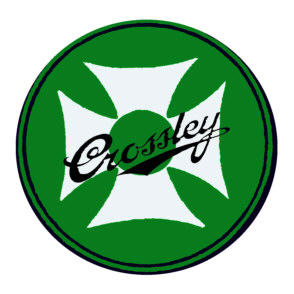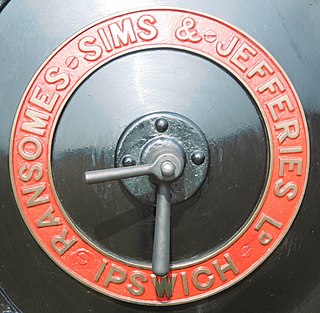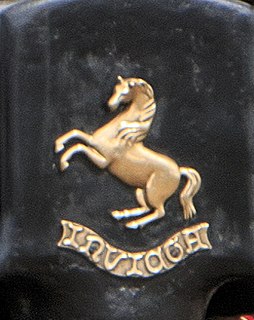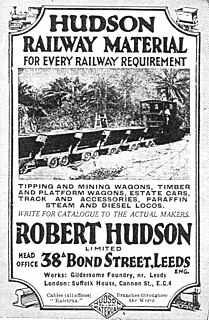
A milk float is a vehicle specifically designed for the delivery of fresh milk. Today, milk floats are usually battery electric vehicles (BEV), but they were formerly horse-drawn floats. They were once common in many European countries, particularly the United Kingdom, and were operated by local dairies. However, in recent years, as the number of supermarkets, small independent grocers and petrol stations, and convenience stores stocking fresh milk has increased, many people have switched from regular home delivery to obtaining fresh milk from these other sources.

Leyland Motors Limited was a British vehicle manufacturer of lorries, buses and trolleybuses. The company diversified into car manufacturing with its acquisitions of Triumph and Rover in 1960 and 1967, respectively. It gave its name to the British Leyland Motor Corporation, formed when it merged with British Motor Holdings in 1968, to become British Leyland after being nationalised. British Leyland later changed its name to simply BL, then in 1986 to Rover Group.

Crossley Motors was an English motor vehicle manufacturer based in Manchester, England. It produced approximately 19,000 cars from 1904 until 1938, 5,500 buses from 1926 until 1958, and 21,000 goods and military vehicles from 1914 to 1945.
Brush Traction is a manufacturer and maintainer of railway locomotives in Loughborough, England. It is a subsidiary of Wabtec.

Ransomes, Sims and Jefferies Limited was a major British agricultural machinery maker also producing a wide range of general engineering products in Ipswich, Suffolk including traction engines, trolleybuses, ploughs, lawn mowers, combine harvesters and other tilling equipment. Ransomes also manufactured Direct Current electric motors in a wide range of sizes, and electric forklift trucks and tractors. They manufactured aeroplanes during the First World War. Their base, specially set up in 1845, was named Orwell Works.

Aveling and Porter was a British agricultural engine and steamroller manufacturer. Thomas Aveling and Richard Thomas Porter entered into partnership in 1862, and developed a steam engine three years later in 1865. By the early 1900s, the company had become the largest manufacturer of steamrollers in the world.

Seddon Atkinson Vehicles Limited, a manufacturer of large goods vehicles based in Oldham, Greater Manchester, England, was formed after the acquisition in 1970 of Atkinson Vehicles Limited of Preston by Seddon Diesel Vehicles Limited of Oldham. In 1974, the firm was acquired by International Harvester, which sold it in March 1984 to the Spanish group Enasa which made it a subsidiary of Pegaso. In 1990, it became part of Iveco which used the brand for various types of specialised vehicles in the United Kingdom. The range of models produced included EuroMover, Pacer and Strato, which are aimed at refuse collection, recycling and construction operators.

Thornycroft was an English vehicle manufacturer which built coaches, buses, and trucks from 1896 until 1977.

Albion Motors was a Scottish automobile and commercial vehicle manufacturer.
Scammell Lorries Limited was a British manufacturer of trucks, particularly specialist and military off-highway vehicles, between 1921 and 1988.

Karrier was a British marque of motorised municipal appliances and light commercial vehicles and trolley buses manufactured at Karrier Works, Huddersfield, West Yorkshire, by Clayton and Co., Huddersfield, Limited. They began making Karrier motor vehicles in 1908 in Queen Street South, Huddersfield. In 1920, H.F. Clayton sold Clayton and Co's Huddersfield business into public listed company Karrier Motors while keeping their Penistone operation separate. Mechanical and electrical engineers Clayton & Co Penistone, remain active in 2020 as Clayton Penistone Group.
Dick, Kerr and Company was a locomotive and tramcar manufacturer based in Kilmarnock, Scotland and Preston, England.

Richard Garrett & Sons was a manufacturer of agricultural machinery, steam engines and trolleybuses. Their factory was Leiston Works, in Leiston, Suffolk, England. The company was founded by Richard Garrett in 1778.

Robert Hudson Ltd was a major international supplier of light railway materials, based in Gildersome, near Leeds, England. The name was later changed to Robert Hudson (Raletrux) Ltd.

A steam wagon is a steam-powered truck for carrying freight. It was the earliest form of lorry (truck) and came in two basic forms: overtype and undertype, the distinction being the position of the engine relative to the boiler. Manufacturers tended to concentrate on one form or the other.

Taskers of Andover were an Andover, Hampshire based metal works and engineering company, which became better known in the latter half of the 20th century for their lorry trailers. After 170 years in operation, the company became first part of the John Brown company, and then sold to Montracon, where it was quietly closed.

The RÁBA Automotive Group, commonly known as Rába, is a Hungarian public limited company, listed on the Budapest Stock Exchange. Rába engineers, manufactures and customizes automotive components, specialty vehicles and axles for commercial vehicles, agri-machinery and earth-movers. The Rába has been building axles as well as complete vehicles since 1902. The company has three strategic business units. The company is headquartered in Győr, employing more than 2000 people.

Morrison-Electricar was a British manufacturer of milk floats and other battery electric road vehicles (BERV). Their first vehicle was built for a bakery in 1933, and the company ceased to exist when it was finally sold to M & M Electric Vehicles in 1983.
Walker Brothers Limited was a manufacturer based in Pagefield Ironworks, Wigan, England. It produced ventilation equipment for mining, truck and bus chassis, mobile cranes, and railway locomotives and railcars.
In 1900 the War Office formed a Mechanical Transport Committee looking to develop the use of mechanical transport as a way to move troops, equipment and supplies. A subsidy scheme - also known as a subvention scheme - was devised where approved vehicles bought by civilian owners would be granted a subsidy in exchange for the vehicles being made available in time of war. While the financial details of the scheme were complex and changed over time, the trials and their results both improved the vehicles and engines available for heavy transport, and had an important influence on the vehicles and engines that were made and used during WW1.
















